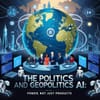The rise of artificial intelligence (AI) is not just about creating new products or improving efficiency; it's also about power and influence. As AI becomes increasingly integral to modern life, the politics and geopolitics surrounding its development, deployment, and governance are taking center stage.
AI has significant implications for global power dynamics, economic competition, and social structures. Countries and companies that control AI development and deployment will have considerable influence over the global economy, security, and culture.
The geopolitics of AI is complex, involving issues like data sovereignty, technological competition, and the potential for AI-driven surveillance states. As AI continues to evolve, nations and international organizations will need to navigate these challenges and develop frameworks for governance, regulation, and cooperation.
Moreover, the development of AI is not a neutral process; it reflects the values, biases, and interests of its creators. Therefore, it's crucial to consider the social and ethical implications of AI and ensure that its development and deployment serve the greater good.
As AI reshapes the world, understanding its politics and geopolitics will be essential for policymakers, business leaders, and citizens alike. By acknowledging the power dynamics at play, we can work towards a future where AI benefits humanity as a whole.


